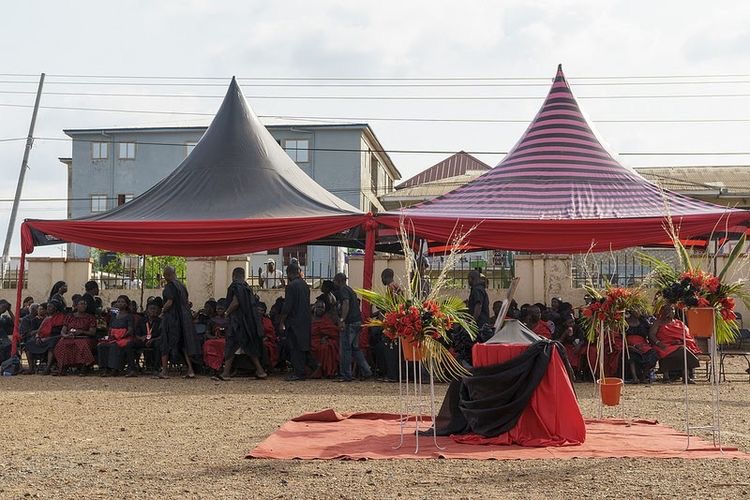Ghanaian funerals are not just a ceremony but a vivid expression of the country's rich culture, blending sorrow with celebration, and marking the passage of a loved one with a profound sense of community and tradition.
Here are the chronological events of Ghanaian funerals, highlighting the unique aspects that make these ceremonies a deep-rooted aspect of Ghana's cultural heritage.
The blend of solemnity and celebration reflects the belief that death is not the end but a transition to the ancestral realm. These events are marked by elaborate rituals, colourful attire, and vibrant music, showcasing the country's rich cultural diversity.
Pre-funeral preparations
Announcement of death
The journey begins with the announcement of death, a solemn occasion where the family gathers to share the news with relatives, friends, and the broader community. This is often done through local radio stations, word of mouth, newspapers and, increasingly, social media platforms.
Setting the date
Choosing the date for the funeral is a critical step, often decided by the elders in consultation with family members. The timing must consider various factors, including the deceased's status, family readiness, and the community's calendar, ensuring that it does not clash with other significant events.
Wake-Keeping: The vigil before the dawn
The night before the funeral, a wake-keeping ceremony is held to honour the deceased. This event is a blend of vigil and celebration, with mourners gathering to sing, pray, and reminisce about the life of the departed. It serves as a communal expression of grief and solidarity.
Funeral day
Dressing the deceased
On the morning of the funeral, the body of the deceased is dressed in elaborate garments, often reflecting their social status, profession, or personal preferences. This is a highly symbolic act, preparing the loved one for their journey to the ancestral world.
Procession to the funeral ground
The procession to the funeral ground is a solemn and dignified march, often accompanied by traditional music and dance. The casket, beautifully adorned, is carried by pallbearers, followed by family members and mourners, all dressed in specific funeral attire, usually in colours signifying mourning and remembrance.
Tributes and eulogies
At the funeral ground, tributes and eulogies are delivered by family members, friends, and representatives from various communities. These speeches celebrate the life and achievements of the deceased, highlighting their impact on the community and the void their passing has created.
Final farewell and burial
The burial is the most solemn part of the funeral, where the deceased is laid to rest in their final abode. This is followed by the pouring of libations and the performance of traditional rites to facilitate a smooth transition to the ancestral realm.
Post-funeral rites
Final funeral rites
Following the burial, the family hosts a gathering, often featuring a feast, to thank mourners and celebrate the life of the deceased. This event may occur immediately after the burial or be scheduled for a later date, allowing distant relatives and friends to pay their respects.
Installation of the family head
In cases where the deceased was the head of the family, a new leader is chosen and ceremonially installed. This ensures the continuity of lineage and the preservation of family heritage.
Memorial services and annual remembrances
Ghanaian culture places great importance on remembering the departed. Memorial services and annual remembrance ceremonies are common, serving as a way to honour the ancestors and keep their memory alive within the community.
The enduring spirit of Ghanaian funerals
Ghanaian funerals are a profound reflection of the country's cultural ethos, embodying the values of family, community, and the cyclical nature of life and death.
Through these rites, Ghanaians not only mourn the loss of their loved ones but also celebrate their lives, ensuring that their legacies endure. In embracing both sorrow and joy, these ceremonies offer a powerful testament to the Ghanaian spirit, where death is seen not as an end, but as a pivotal part of life's continuum.
In the heart of Ghana, funerals are more than just a farewell; they are a vibrant celebration of life, a homage to ancestry, and a profound gathering that strengthens the bonds of community.

